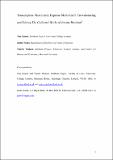Transcription maximized; expense Minimized? Crowdsourcing and editing The Collected Works of Jeremy Bentham
Date
2012-03-28Author
Causer, Tim
Tonra, Justin
Wallace, Valerie
Metadata
Show full item recordUsage
This item's downloads: 1041 (view details)
Cited 36 times in Scopus (view citations)
Recommended Citation
Causer, Tim, Tonra, Justin, & Wallace, Valerie. (2012). Transcription maximized; expense minimized? Crowdsourcing and editing The Collected Works of Jeremy Bentham. Literary and Linguistic Computing, 27(2), 119-137. doi: 10.1093/llc/fqs004
Published Version
Abstract
This article discusses the crowdsourced manuscript transcription project Transcribe Bentham, and how it will impact upon long-established editorial practices at the Bentham Project, University College London, which is producing the new and authoritative edition of The Collected Works of Jeremy Bentham. We site Transcribe Bentham
in the burgeoning field of scholarly crowdsourcing projects, and, by
detailing our experiences of running and administering
the project, attempt to assess the potential
benefits of engaging the public in humanities research. The article
examines
the conceptualization and development of Transcribe Bentham,
and how editorial practices at the Bentham Project may change as a
result. We account for the design of the bespoke transcription
tool which is at the project's heart, and which
allows volunteers to transcribe the material and encode it in
TEI-compliant
XML. We attempt to answer five key questions: is
crowdsourcing the transcription of complex manuscripts cost-effective?
Is
crowdsourcing exploitative? Are volunteer-produced
transcripts of sufficient quality for editorial use and uploading to a
digital repository, and what quality controls are
required? Does crowdsourcing ensure sustainability and widen access to
this
priceless material? And finally, should the success
of a project like Transcribe Bentham be measured solely according to cost-effectiveness or the volume of work produced, or do considerations of public engagement
and access outweigh such concerns?


